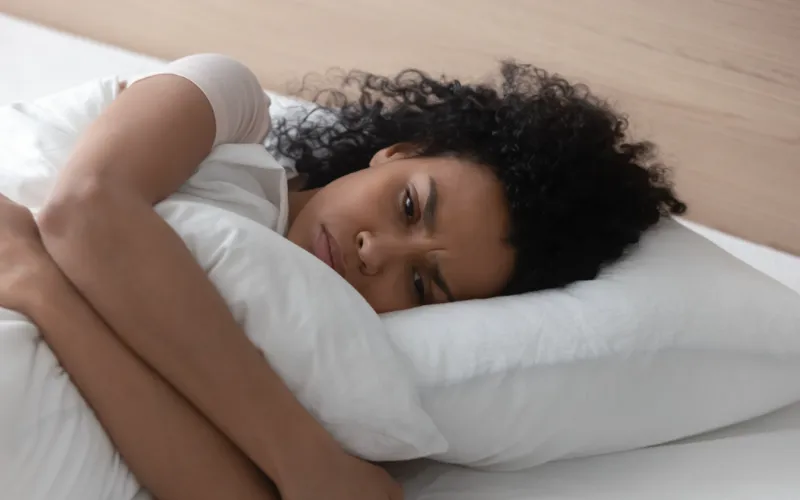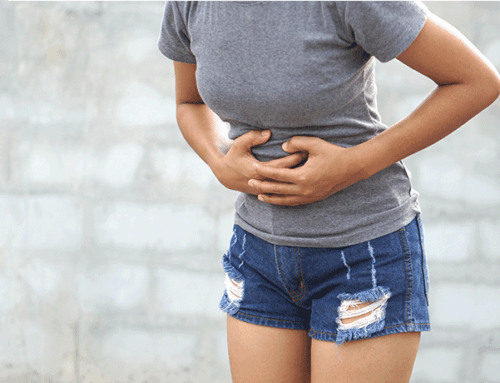Sleep can be elusive enough without the added stress of changing hormones. Female health is a complex matrix, and one often-overlooked factor that can significantly affect sleep patterns, mood, and general well-being is menstruation. This blog post dives into an issue many women grapple with but remains under-discussed: menstruation insomnia. If you’ve ever found yourself wide awake in the early hours, you should be dreaming; your menstrual cycle could be the culprit. Ready to unravel this mysterious correlation between periods and sleep deprivation? Stay with us as we delve deeper into why your period affects your sleep and what you can do about it for a peaceful slumber every night of the month.
Menstruation insomnia is a type of sleep disorder that is experienced by some women before and during their period due to hormonal changes. It can manifest as difficulty falling asleep, staying asleep, or waking up too early. Symptoms may include fatigue, mood changes, and difficulty concentrating during the day. Practicing healthy sleep habits and addressing any underlying conditions like anxiety or hormonal imbalance can help alleviate symptoms.
Understanding Menstruation Insomnia
Menstruation insomnia, the sleep disturbance that occurs before or during a woman’s menstrual period, is a common issue experienced by many women. It can be frustrating and disruptive to one’s daily life, affecting not only physical well-being but also emotional and mental health. To better understand menstruation insomnia, it’s essential to consider its underlying causes and how hormonal fluctuations play a significant role.
The Menstrual Cycle and Hormonal Fluctuations
The menstrual cycle has four stages: the menstrual phase, follicular phase, ovulation phase, and luteal phase. Throughout these stages, hormone levels fluctuate, particularly estrogen and progesterone. These hormones rise and fall in different phases of the menstrual cycle and are responsible for various physiological changes within a woman’s body.
Learn More: Suppositories vs Oral Probiotics for Feminine Health: Which is Better?
Hormonal Impact on Sleep
Hormonal changes during the menstrual cycle can impact body temperature, melatonin production, and sleep architecture. Estrogen, for example, influences serotonin receptors in the brain, which regulate sleep patterns. Fluctuations in estrogen levels may disrupt serotonin function, leading to difficulty falling asleep or staying asleep throughout the night.
Imagine your body as a symphony orchestra where each hormone plays a different instrument. During your menstrual cycle, these instruments create beautiful melodies together. However, sometimes they hit a sour note, disrupting sleep harmony.
Physical and Emotional Symptoms During Menstruation
In addition to hormonal fluctuations, other physical and emotional symptoms commonly associated with menstruation can contribute to insomnia. Physical symptoms such as bloating, breast tenderness, constipation or diarrhea, cramps, headaches, fatigue can make it challenging to find comfort and relax into sleep. Emotional changes like anxiety, irritability, mood swings can heighten stress levels and prevent restful sleep.
Role of Hormonal Fluctuations
Hormonal fluctuations, particularly those of estrogen and progesterone, play a vital role in menstrual-related insomnia. During the luteal phase of the menstrual cycle, which occurs after ovulation and before menstruation starts, the body experiences a surge in progesterone levels. This increase in progesterone can cause drowsiness and fatigue, making it tempting to fall into slumber during the day. However, these elevated hormone levels may disrupt sleep architecture and quality at night.
Additionally, hormonal changes can affect body temperature regulation, increasing body heat during certain menstrual cycle phases. This rise in body temperature can make it uncomfortable to fall asleep or stay asleep throughout the night.
Remember that hormones are like conductors directing your body’s sleep symphony. When they’re out of tune, your sleep may suffer.
Learn More: Hormonal Imbalance Reasons: Understanding the Causes
Impact on Melatonin Production
Moreover, hormonal fluctuations may impact melatonin production. Melatonin is a hormone that helps regulate sleep-wake cycles. Variations in hormone levels can disrupt the natural release of melatonin, making it challenging to fall asleep or maintain a consistent sleep pattern.
While hormonal fluctuations are central to understanding menstruation insomnia, it’s important to recognize that individual experiences may vary. Stress levels, overall health, and lifestyle choices can also influence sleep patterns during the menstrual cycle.
Now that we’ve explored the understanding of menstruation insomnia and the role hormonal fluctuations play, let’s delve into the various physical and emotional symptoms commonly experienced during this time and how they contribute to disrupted sleep patterns.
Physical and Emotional Symptoms
Imagine this: It’s that time of the month again, and you start to notice changes in your body. Maybe you feel a bit bloated, experience breast tenderness, or have stomach cramps. These physical symptoms are just the tip of the iceberg when it comes to menstruation. Alongside physical discomfort, many women also face emotional challenges during this time. Feelings of sadness, anxiety, irritability, and mood swings can creep in, affecting both their daily lives and sleep patterns.
Nonetheless, it’s important to remember that these symptoms can vary from person to person. Some women may experience mild discomfort, while others may have more severe issues. The key is to tune in to your body and know how your menstrual cycle affects you personally.
Physical and Emotional Symptoms
During the menstrual phase, hormone levels drop significantly, leading to potential fluctuations in mood and energy levels. As the cycle progresses into the follicular phase, estrogen levels increase gradually, which can contribute to a surge of vitality and improved mood for some individuals. However, as ovulation approaches during the ovulation phase, certain women may feel more irritable or experience intensified emotions due to hormonal changes.
Now that we’ve explored the physical and emotional symptoms associated with menstruation, let’s delve into an area that often goes hand in hand with these challenges – sleep deprivation and emotional distress.
- Menstruation can bring about physical discomfort and emotional challenges, but it’s important to be aware of how your body reacts to it personally. Hormone fluctuations during the menstrual cycle can affect mood and energy levels, with some women experiencing more severe symptoms than others. Sleep deprivation and emotional distress can also be common during this time, so it’s essential to take care of oneself by getting enough rest and seeking support when necessary.
Sleep Deprivation and Emotional Distress
The correlation between menstruation and sleep disturbances is not a mere coincidence. Hormonal changes during different menstrual cycle phases can significantly impact sleep patterns. Many women report difficulty falling asleep or staying asleep during the days leading up to their period.
Hormonal Impact on Sleep Patterns
Progesterone levels rise dramatically during the luteal phase, right before menstruation begins. This increase can interfere with normal sleep patterns, causing mid-sleep awakenings or a restless night’s sleep. Additionally, estrogen levels, which fluctuate throughout the cycle, can affect the production and regulation of melatonin, a hormone that helps regulate sleep.
Sleep Disruption and Emotional Distress
Think of it like a delicate dance between hormones and sleep. When these hormones are out of sync, it’s as if the dancers on the floor stumble and cause disruptions in the smooth flow of sleep.
Managing Emotional Distress During Menstruation
Sleep deprivation caused by hormonal imbalances can lead to emotional distress. Lack of sleep can increase feelings of anxiety, irritability, and depression during an already challenging time. The combination of physical discomfort and disrupted sleep can create a perfect storm for emotional turbulence.
Practical Strategies for Emotional Well-being
For instance, you may be tossing and turning throughout the night, unable to find a comfortable position due to bloating or cramps. As your fatigue increases, so does your frustration and irritability. Your emotional state becomes more fragile, making it difficult to handle daily stressors effectively.
Causes of Menstruation Insomnia
When faced with such emotional distress during menstruation, it’s essential to practice self-care and seek support when needed. Engaging in relaxation techniques like deep breathing exercises, meditation, or warm baths can help alleviate some symptoms and promote better sleep.
Now that we’ve explored how menstruation can impact physical and emotional well-being let’s dive deeper into uncovering the underlying causes behind these challenges.
Learn More: The Top 10 Fruits That Are Good for Digestion and Wellness
Unveiling the Causes
Understanding the causes of menstruation insomnia is crucial in finding effective solutions. Hormonal fluctuations during the menstrual cycle play a significant role in disrupting sleep patterns. Two key hormones, estrogen and progesterone, rise and fall during different menstrual cycle phases, impacting both physical and emotional well-being.
Estrogen’s Impact on Sleep
During the follicular phase, which occurs after menstruation, estrogen levels rise. This hormone is associated with increased energy levels and improved mood, which may contribute to better sleep quality during this phase. However, estrogen levels peak as the ovulation phase approaches and then decline sharply. This hormonal shift can cause some women to experience difficulty falling asleep or staying asleep.
For instance, Sarah, a 32-year-old woman in the luteal phase of her menstrual cycle, finds it challenging to fall asleep at night due to heightened anxiety and restlessness. She often lies awake for hours before finally drifting into an unsettled sleep.
Progesterone’s Role in Sleep
In addition to estrogen’s impact on sleep, progesterone also plays a role. Progesterone rises during the luteal phase and is known for its soothing effects. While this hormone promotes overall relaxation and can lead to better sleep quality for some women, others might still experience disruptions due to its influence on body temperature regulation.
The Complex Relationship Between Hormones and Sleep
The exact mechanisms behind these hormonal fluctuations that affect sleep are not fully understood. However, research suggests that they impact body temperature regulation, melatonin production, and the overall architecture of sleep cycles. For example, changes in progesterone levels can affect body temperature and lead to hot flashes or night sweats that disrupt sleep.
Emotional Factors and Sleep
It’s essential to note that hormonal changes do not solely cause insomnia related to menstruation. Emotional factors like anxiety or depression associated with premenstrual syndrome (PMS) can also contribute to sleep disturbances. Moreover, physical discomfort, such as bloating or cramps, can make it difficult for women to sleep comfortably.
Now that we have explored the causes of menstruation insomnia, let’s dive into how different menstrual cycle phases impact sleep patterns.
Impact of Menstrual Cycle Phases
The menstrual cycle consists of four distinct phases: the menstrual phase, follicular phase, ovulation phase, and luteal phase. Each phase changes hormone levels and bodily processes, potentially affecting sleep differently.
Sleep Challenges During the Menstrual Phase
During the menstrual phase, which marks the beginning of the cycle, many women experience discomfort due to cramps or physical fatigue. This can make falling asleep more challenging. Additionally, heavy periods might require frequent nighttime bathroom visits, disrupting sleep continuity.
Improved Sleep Quality in the Follicular Phase
As the follicular phase begins after menstruation, estrogen levels gradually rise. This increase in estrogen leads to improved mood and energy levels for most women. Consequently, sleep quality during this phase tends to be better than other menstrual cycle phases.
Learn More: Probiotics for Constipation Relief: Improving Gut Health Naturally
Challenges in the Ovulation Phase
However, as the ovulation phase approaches, estrogen peaks and subsequently declines. This hormonal shift can disrupt sleep patterns by causing restlessness and difficulty falling asleep or staying asleep. Women who experience symptoms like anxiety or mood swings during this period may be particularly susceptible to sleep disturbances.
Melissa, a 29-year-old woman in her ovulation phase, often finds herself waking up multiple times throughout the night feeling restless and anxious. She struggles to fall back asleep and wakes up feeling fatigued the next day.
Progesterone’s Influence in the Luteal Phase
During the luteal phase, progesterone levels rise while estrogen decreases further. While progesterone is known for its calming effects and may improve sleep quality for some women, others may still experience disrupted sleep due to temperature regulation issues or heightened sensitivity to other PMS symptoms such as breast tenderness or bloating.
Effective Strategies for Better Sleep
By understanding how each stage of the menstrual cycle impacts sleep patterns, women can gain insights into why they may experience insomnia at certain times and tailor their strategies for better sleep accordingly.
Effective Treatments and Techniques
When it comes to managing menstruation insomnia, some several effective treatments and techniques can help improve sleep quality during your period. One of the most widely recommended approaches is practicing good sleep hygiene. This involves establishing a consistent sleep schedule, creating a calming bedtime routine, and ensuring your sleep environment is comfortable and conducive to restful sleep.
Stress Management and Sleep
Additionally, managing stress levels through relaxation techniques can significantly impact sleep during this time. Engaging in deep breathing exercises, meditation, or yoga can help reduce anxiety and promote better sleep. Finding what works best for you regarding stress reduction is key, as everyone has different preferences and coping mechanisms.
For instance, Sarah, who often struggled with insomnia before her period, found solace in incorporating a nightly meditation session into her bedtime routine. She discovered that practicing mindfulness helped calm her racing thoughts and eased her into a more peaceful sleep.
Exercise and Sleep
Regular exercise’s also worth considering as part of your overall approach to managing menstruation insomnia. Physical activity can help regulate hormone levels and promote better sleep. However, aim to complete your workout a few hours before bedtime to allow your body time to wind down before sleep.
Supplements for Improved Sleep
Additionally, if lifestyle adjustments alone aren’t providing the desired results, various supplements may aid in alleviating symptoms of menstruation insomnia. Magnesium has been found to have calming effects on the body and promote relaxation, making it a popular supplement choice for those struggling with sleep issues related to their period.
Melatonin Supplements
Another potential supplement option is melatonin, a hormone naturally produced by the body to regulate sleep-wake cycles. Taking melatonin supplements can help signal to your body that it’s time for sleep and assist in falling asleep more easily.
The next section’ll explore the importance of lifestyle adjustments and specific supplements that may relieve menstruation insomnia.
Lifestyle Adjustments and Supplements
In addition to the treatments and techniques mentioned, making specific lifestyle adjustments can greatly impact your sleep during your menstrual cycle.
Diet
One important aspect to consider is your diet. Avoiding caffeine and alcohol before bed is highly recommended, as they can disrupt sleep patterns and worsen symptoms of insomnia. Instead, opt for soothing herbal teas like chamomile or lavender to promote relaxation.
Furthermore, creating a comfortable sleep environment is crucial. Ensure your bedroom is cool, dark, and quiet. Investing in blackout curtains, earplugs, or a white noise machine may help create an optimal sleeping environment that promotes better rest.
Lifestyle
Find that symptoms of menstruation insomnia persist despite lifestyle adjustments. It may be beneficial to explore over-the-counter sleep aids or consult a healthcare professional for further guidance. They can provide personalized recommendations based on your specific needs and circumstances.
It’s important to remember that what works for one person may not work for another when managing menstruation insomnia. Finding the most effective approach for you may take some trial and error. Patience and perseverance are key as you navigate through different treatments and techniques.
Can hormonal birth control or other medications help with menstruation insomnia?
Hormonal birth control or other medications can help alleviate menstruation insomnia for some individuals. These medications work by regulating hormone levels, which can help to stabilize sleep patterns.
What causes menstruation insomnia, and how does it differ from other types of insomnia?
Menstruation insomnia occurs due to hormonal changes during the menstrual cycle, specifically the fluctuation of estrogen and progesterone levels. These hormonal variations can disrupt sleep patterns, leading to insomnia.
How can healthcare providers diagnose and treat menstruation insomnia?
Healthcare providers can diagnose menstruation insomnia by evaluating the sleep patterns and symptoms experienced during each menstrual cycle. They may track the duration and severity of insomnia and any sleep quality or quantity changes. Treatment for menstruation insomnia can involve both lifestyle modifications and medical interventions.
Are there any natural remedies or lifestyle changes that can alleviate menstruation insomnia?
Yes, there are natural remedies and lifestyle changes that can alleviate menstruation insomnia. Regular exercise during the day can improve sleep quality, reduce stress, and help regulate hormones.
What effect does menstruation insomnia have on overall health and well-being?
Menstruation insomnia can significantly impact overall health and well-being. Sleep disturbances during menstruation can lead to increased daytime fatigue, decreased concentration, and mood swings, affecting daily functioning and quality of life.




